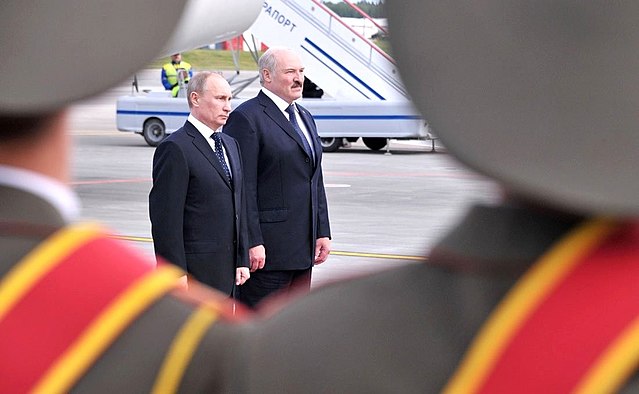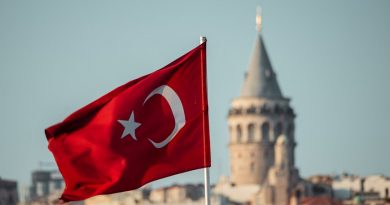Intertwined Fates: How the War in Ukraine Will Determine the Future of Belarus’ Opposition Movement
Kasia Kostraba
Staff Writer
Aleksandr Lukashenko, Belarus’ self-proclaimed dictator, has been in power since the establishment of Belarus in 1991. In 2020, his reign was extended for the sixth time in an election considered fraudulent by much of the international community as fraudulent, as an estimated 60-70 percent of Belarusians voted for opposition leader Svetlana Tsikhanovskaya. Two years later, the opposition movement’s fight for freedom is intertwined with the fight of neighboring Ukrainians against Russia.
Tsikhanovskaya has dedicated her life to fighting for a free and democratic Belarus following the 2020 election; meeting with world leaders, lobbying for sanctions, and much more while being exiled and living in Lithuania. In an interview with TIME, she implored the world to not forget about Belarus, stating “We need Belarus not to be overlooked because Belarus is not only a part of this crisis… Belarus can be part of the solution.” Tsikhanovskaya’s revolution runs primarily on the platform of providing Belarus with free and fair elections. In turn, she advocates for the freeing of political prisoners, such as her husband. Followers of the revolution strive for free press, free speech, a better economy, and a revamp of foreign relations, primarily moving away from Russian alliances and strengthening relations with the West.
Lukashenko’s regime has played a crucial role in Russia’s invasion by allowing Russia to house its troops and equipment on Belarusian soil. This is unsurprising, as it is not a secret that Lukashenko’s rule is heavily supported by Putin. On October 10, the countries agreed to deploy a “joint regional group of forces” to Ukraine following a one-on-one meeting between Putin and Lukashenko. Providing troops to the Russian cause upholds the Belarusian state’s dedication to Russia, and Lukashenko’s fear of Western intervention, particularly as NATO heavily monitors the war.
For Lukashenko, demonstrating support for Russia in the war in Ukraine is simply a game of self-preservation, as Putin has previously protected him from Western sanctions and provided him with security forces during the 2020 election protests. Supporting the Russian efforts in Ukraine is Lukashenko’s way of letting Putin know he has invested in the right places. However, the presence of Russian troops in Belarus poses an increased security risk to NATO members, as Poland, Lithuania, and Latvia have historically viewed Belarus as a buffer between them and mainland Russia.
Placing Russian troops in Belarus is strategic for Putin, both for his campaign in Ukraine and as an attempt to cut off the Baltic states from the West. Belarus provides Russia access to the Suwalki Corridor, the border between Lithuania and Poland that separates Belarus from the Russian enclave of Kaliningrad. While the move to take control of the corridor sounds farfetched due to Russia’s struggle to advance in Ukraine, the Baltic states alongside Poland are bracing for the worst. Russia taking control of the corridor would require attacking both Lithuania and Poland, starting a war between NATO and Russia. While this is seemingly illogical, is not impossible.
Putin’s ability to easily manipulate Lukashenko makes it likely that Belarusians will be deployed to fight alongside Russian, although Tsikhanovskaya has affirmed that deployment has not yet been announced. Regarding the possibility of future deployment, she stated “If it happens that under pressure, under threats, Belarusian troops will be deployed, we’re urging our soldiers to lay down their arms, join the guerillas, change sides, join the Ukrainian military.” However, this would be easier said than done.
Support for Russia’s war has cost Lukashenko support domestically, as isolation from the rest of Europe has had extreme economic impacts on the country and tainted his already poor reputation at home. In February, protests against the Russian invasion broke out across Belarus, as the invasion coincided with Belarussian voting on a constitutional referendum. These changes aimed to strengthen Lukashenko’s power, allowing him to remain in office until 2035 and eliminating a constitutional clause that declared Belarus a “nuclear-free zone.” According to the Belarus Central Elections Committee, 65.2 percent of Belarussians voted in favor of the referendum. The effects are clearly seen in Putin’s talk of nuclear warfare, as the constitutional changes could make it so that weaponry could be stored on Belarusian soil. During the protests, an estimated 300 people were detained and arrested, although many speculate that the true number is much higher.
Protesting in Belarus has high stakes, as freedom of speech is extremely restricted, media is constantly monitored, and democracy is non-existent. Freedom House’s 2021 report gave the nation an 11/100 on their freedom index, placing the nation under the status of “not free.” Tsikhanovskaya mentioned this lack of freedom when she attended the Warsaw Security Conference earlier this month, stating “It’s because we live in a Gulag, in an atmosphere of tyranny and terror and repressions. Any person can be detained for any comment on Instagram, anti-war comments or anti-regime comments, and our task is to keep people safe, to keep people prepared for new opportunities.” Despite this, many citizens have become increasingly willing to take to the streets as relations between Minsk and Moscow have tightened. Tsikhnaovskaya believes that the war gives her people an opportunity at more successful protests, as Russia’s depleted resources and focus on the war will not allow Putin to save Lukashenko again.
The white-red-white flag, the former national flag of Belarus outlawed via referendum in 1995, made a resurgence in 2020 and has continuously been seen across the nation as a small act of protest, now representing the symbol of a democratic Belarus. Border guards at stations in the Brest region, which neighbors Poland, hung out the white-red-white flag alongside the nationally recognized red and green flag of Belarus. Upon discovery by the regime, the opposition flag was blurred on national television. Acts such as these show the Belarusian people’s desire for independence, something that seems more and more likely as the tides turn in favor of Ukraine in the war.
Tsikhanovskaya emphasizes the intertwined fates of Belarus and Ukraine, reasoning that the world should also view Belarus as an occupied territory. Lukashenko’s power entirely stems from the Kremlin, making Belarus a puppet for Putin’s Russia. During a visit to Estonia, Tsikhanovskaya stated that “We are in the same boat, of course the situation is completely different; there is…a terrible war there while in Belarus there are political and military repressions. But we draw on the fact that Russia considers neither Ukraine, nor Belarus sovereign independent states.”
In August, Tsikhanovskaya developed the United Transitional Cabinet, a temporary governing body of the opposition movement. Four cabinet members have been announced, two of which reportedly defected from the Belarusian security service. Via social media platforms, primarily Telegram, the United Transitional Cabinet has gained a network of thousands of followers, ready to provide immense change to their beloved nation. Liberation, independence, and democracy are cited as the three main goals of the United Transitional Cabinet in the Declaration on the Goals and Values of the Belarusian Democratic Forces; which will be achieved through upholding respect for human dignity, solidifying Belarusian nation identity, uplifting the initiatives of the people, and solidarity in the fight against dictatorship and for a transparent, democratic government.
In addition to the United Transitional Cabinet, Tsikhanovskaya has pleaded to various world leaders about the dangers of forgetting Belarus amidst the war. Tsikhanovskaya appeared at the UN General Assembly in September alongside the Estonian delegation, urging the international community to provide support for Belarus. Estonia plans to appoint an ambassador-at-large to assist the democratic Belarusian movement, which is centered in Vilnius, where Tsikhanovskaya currently lives.
Tsikhanovskaya has mentioned reaching out to Ukrainian President Volodymyr Zelenskyy to formalize an allegiance, however nothing has come of it to public knowledge. Looking from a Ukrainian perspective, hesitancy to align with anything remotely Belarusian amidst the housing of Russian military and artillery would not be uncalled for. However, Tsikhanovskaya’s movement is verifiably anti-Lukashenko and anti-Russian invasion of Ukraine. Many worry that Ukrainian hesitancy to align with Tsikhanovskaya’s movement may hinder relations when Belarus gains freedom from the shackles of the regime.
If Russia loses the war in Ukraine, opportunity will inherently open itself for the democratic movement in Belarus to gain a stronghold. On its own, Lukashenko’s regime would not be strong enough to counteract protests that would erupt from a Ukrainian victory. The Belarussian people would rise to the opportunity, knowing the weakness of the current administration and how Russia, if defeated, would be depleted of resources. It is only a matter of time before Ukraine and in turn, Belarus, see freedom.
Image Courtesy of Presidential Press and Information Office



